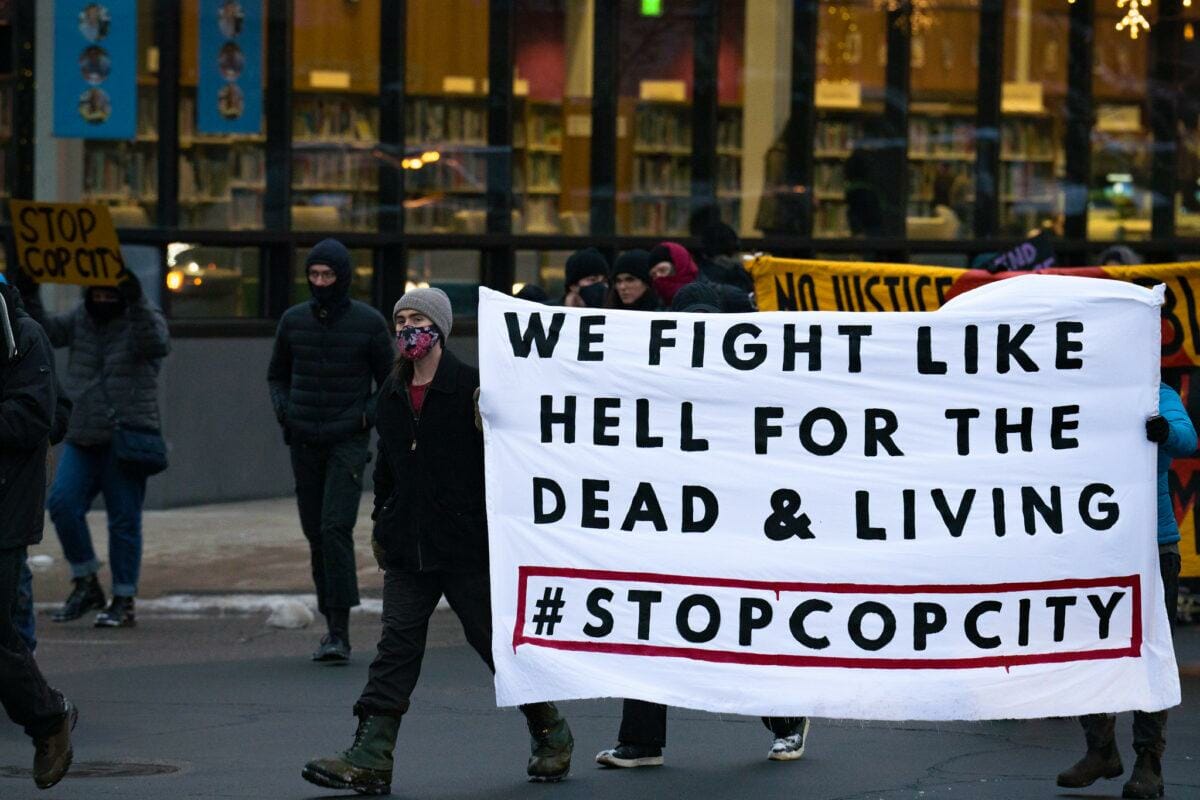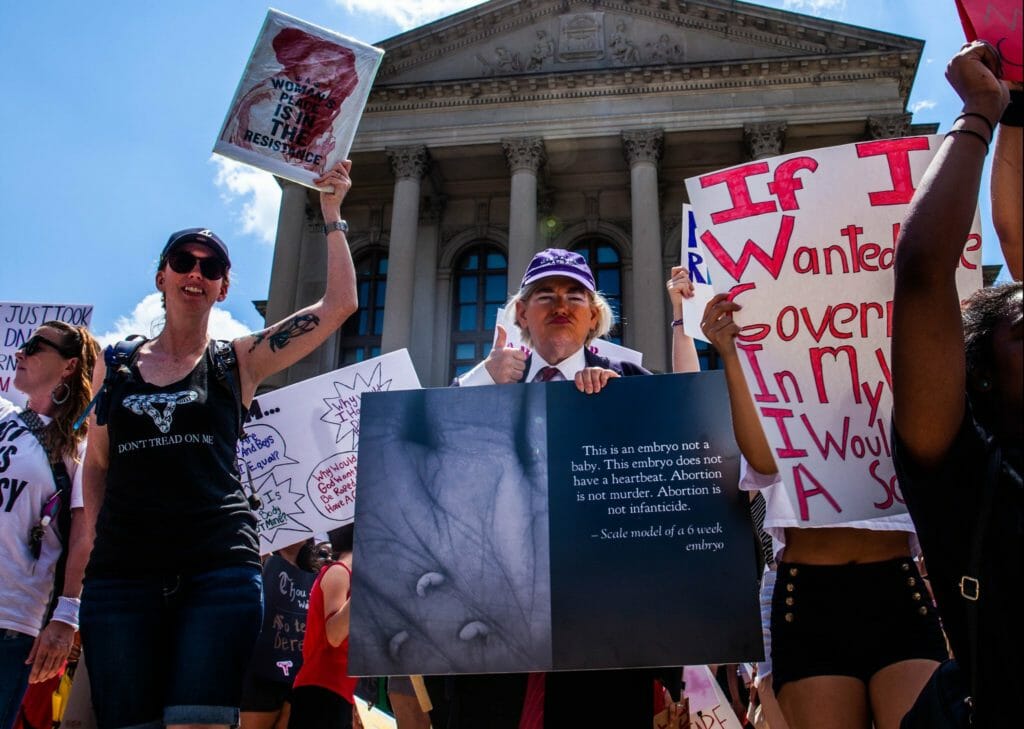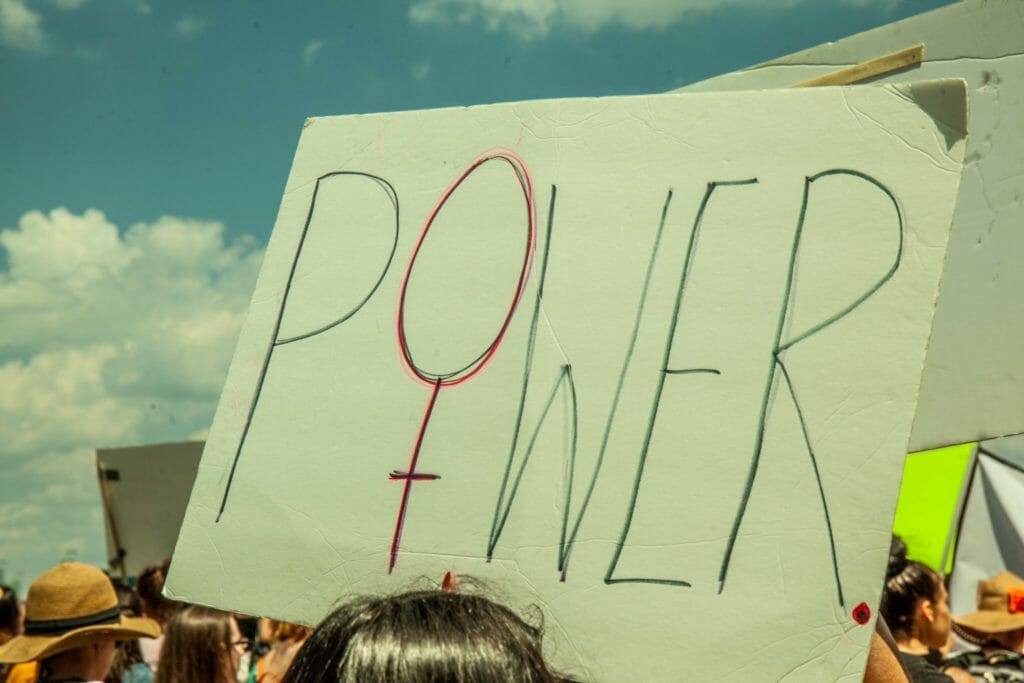After a new development of preliminary trial concerns in the courts, judge says she is unclear when the first Cop City RICO trial will resume
ATLANTA—This morning, around 30 people sat in Judge Kimberly Adams’ courtroom in the Fulton County Courthouse in downtown Atlanta awaiting the anticipated trial of Ayla King. King, who is 19-years-old, is one of 61 people facing RICO (Racketeer Influenced and Corrupt Organizations) charges for their protest against the $90 million-plus police militarization facility, widely known as “Cop City.” Forty-two of the RICO defendants, including King, have also been accused of domestic terrorism; however, all those accused of domestic terrorism have yet to be formally indicted by a grand jury.
Pre-trial motion hearings took place on Mon., January 8. However, the defense has since filed a new challenge, claiming the courts have not complied to the statutory speedy trial demand, therefore presenting grounds to dismiss the case altogether. This filing has presented what Judge Adams referred to as an “unavoidable delay” in the trial’s proceedings. The jury was dismissed until further notice, but have not been discharged from the case entirely. According to Adams, it is unclear when King’s trial will resume. She told jurors they would receive at least one week’s notice before they’re expected to return, and that they could expect to be dismissed over the next two to four weeks.
State prosecutor John Fowler, who said the state was ready to call witnesses and begin the trial, presented arguments to the judge citing case law that affirmed the defendant’s right to a speedy trial and their right to challenge under the statutory speedy trial demand. Adams agreed, and called jurors in to explain the delay and what they could expect next.
Mainline spoke with defense attorney Don Samuel—who is representing bail fund organizers of the Atlanta Solidarity Fund, who were raided and charged with money laundering on May 31, 2023, and are also charged with RICO—to explain the statutory speedy trial statute and his motion filing to quash the entire indictment.
Samuel’s motion, which has been adopted by multiple other defense attorneys, can be found here. King’s attorney argued some claims in the filing to Judge Adams during the pre-trial motions hearing, and Adams dismissed the arguments for King’s case.
Aja Arnold: Let’s start with today’s unexpected delay in the trial. What are your thoughts? What was your reaction to that news?
Don Samuel: I think it’s the right of the attorney to challenge the violation as he claims of the speedy trial act. He filed a motion, a demand for trial back in late fall or early winter to have a speedy trial. The judge agreed to at least pick the jury in December, but not start the trial until January. And he’s saying that, according to the statute, the trial has to actually be conducted before the end of the second term. He has the right to challenge that. The law is not very strong on that right now, but it may change. And he certainly has the right to insist on compliance with his view what the speedy trial act requires.
Arnold: For our readers, would you mind explaining a bit more in layman terms what the speedy trial demand is, for people to understand who might not know the law very deeply?
Samuel: Speedy trial demand requires that the trial start within the next term of court. Either the court in which the indictment is returned, the term in which the indictment is returned, or the following term. In this case, it is required that the case be tried by December. It has to start by December. The judge interpreted that to mean we have to at least pick the jurors by the end of December. But we don’t necessarily, she said, have to complete the trial. He’s saying, he agrees that you have to start the trial, but that means more than just pick the jurors. You have to actually start having witnesses. So if you pick the witnesses on December 30th or 31st, that would comply with the statute, because you’ve started the trial. But just picking the jury and then adjourning until January doesn’t constitute starting the trial. That’s about as simple as simple as I can make it.
Arnold: Could you share a general breakdown of the indictment as you understand it?
Samuel: You’re asking a question that would take half a semester of the class I teach at law school to explain. But the bottom line is that the RICO indictment in this case is a conspiracy to violate RICO and then, at the back end, a bunch of substantive counts. Substantive counts, meaning specifically, crimes that were committed after the RICO. The RICO conspiracy allegation is that the 61 defendants were all part of what’s known as an “association in fact.” They all had agreed among themselves that they would commit a series of crimes to achieve a common goal, which was to stop the building of the police training facility, colloquially known as “Cop City.” And that even though they didn’t all know each other and they didn’t all act at the same time, they were part of a conspiracy to accomplish this goal, meaning they all had joined into this agreement even though they weren’t all doing it at the same time or in the same way. So that’s the basic essence of the allegation.
And then [the indictment] goes forward over the course of 70, 80, 90 pages to list the things they did to show that they were all working as a team, so to speak, or working together as a group. Various acts of trespassing, acts of destroying certain property, some expenditures of money to facilitate those two things. That’s, in the broadest way, what the allegations are.
Then what we call substantive counts, or a series of crimes after the RICO conspiracy, some of which involve my clients for money laundering, which we’ve challenged; and then there’s a count of committing the crime of domestic terrorism. That’s how the indictment is framed. Our challenge to the indictment is … some of it’s very technical requirements that are required by the statute at how RICO has to be pled; and some are more broad challenges to the vagueness of the allegations, that these people don’t know each other, the fact that they’re engaged in First Amendment activity. The fact that the right to protest is not something that could be punished as a RICO violation. There’s a lot of challenges to the indictment and I’m not sure I could summarize it and do justice to all the challenges that were filed. So, I’ll leave it at that as far as the broad answer.
Arnold: On Mon., January 8, in pre-trial motions hearings for defendant King’s case, Judge Adams reportedly shut down your filing to quash the indictment, which contains, as I understand it, a general and specific arguments. Am I understanding that correctly?
Samuel: I wasn’t there, but I understood that [King’s attorney] argued some of the issues that I raised and [Adams] ruled against it. I mean, she can’t really rule against me or my client without us being there. Obviously, it’s not a good sign that he adopted our filing and she denied his adoption, but she has to give us the right to argue. She can’t deny us the right to present our argument, so we’ll see on a later day how that goes. We didn’t sacrifice our right to argue our motions or present our version of why we should win just because someone filed a demand for trial and went first. That’s not rational at all.
This is an ongoing story, and we will continue to report as things develop.




